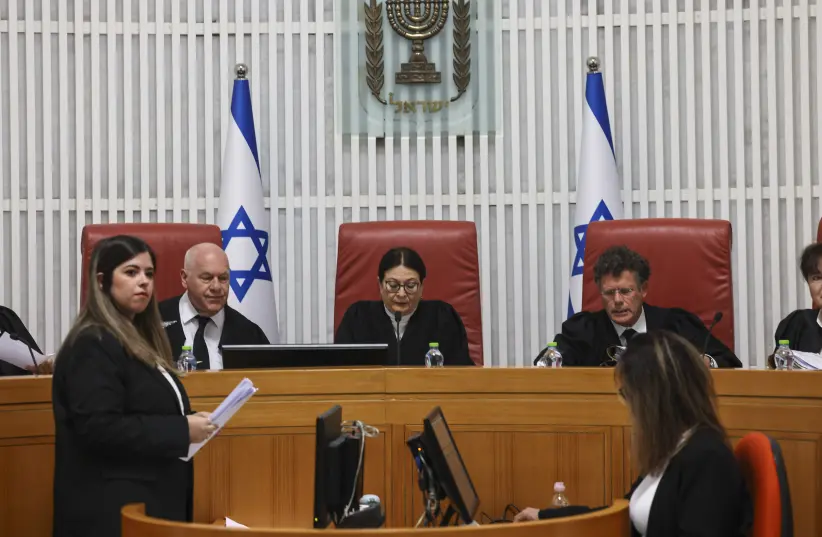The new government’s first test in its plans for a judicial overhaul began in earnest on Thursday, as the High Court delved into Arye Deri’s ministerial appointment.It heard arguments on petitions against the appointment of the Shas chairman – despite his criminal offenses – and the so-called “Deri Law,” which allowed his appointment by amending the Basic Laws.The justices adjourned after six hours, leaving the country waiting for a ruling that might alter the government.
Chief Justice Esther Hayut said there were three issues at the heart of the debate: abuse of the Knesset’s constitutional authority to commute a criminal punishment, the reasonableness of Deri’s appointment and the Shas chairman’s plea-bargain agreement not to return to public life.
Charged with tax offenses, Deri signed a plea bargain that gave him a suspended prison sentence and a fine. According to Basic Law: The Government, a citizen who has been given a prison sentence cannot serve as an MK or as a cabinet minister for seven years, if their actions included “moral turpitude.”
The Central Elections Committee chairman is supposed to decide whether the offense is considered moral turpitude. In December, the “Deri Law” was passed, which amended the Basic Law, exempting those with suspended sentences from the restriction.
Deri has expressed repeated pattern of criminal offenses – A-G
Justices challenged the respondents’ attorneys to determine if the Knesset abused its constitutional authority in altering the Basic Laws to allow Deri to supersede criminal rulings. They asked Deri’s representatives why they hadn’t approached the CEC before seeking to amend the law, which the legal counsel admitted he regretted.
In saying there was no doubt the Basic Law was amended to allow Deri’s appointment, Attorney-General’s Office representative Aner Hellman said, “If it looks like a duck, walks like a duck and sounds like a duck…In saying there was no doubt the Basic Law was amended to allow Deri’s appointment, Attorney-General’s Office representative Aner Hellman said, “If it looks like a duck, walks like a duck and sounds like a duck…”
However, the very concept of the reasonableness principle has come under fire. One Shas Party representative argued that the matter of reasonableness relies on an interpretation of what is extreme, which is highly subjective.
On Wednesday night, as Justice Minister Yariv Levin unveiled his judicial reform plan, he exclaimed, “There is no such thing as a reasonableness principle.” Levin’s plan also sought to regulate judicial review, which would need to be undertaken with a special majority. Critics saw the introduction of the plan the night before the Deri Law hearing as interference in the case.
Shraga made mention of Levin’s announcement in his monologue, saying it was a threat to the judiciary. In his argument, Shraga also noted that Deri had accepted the plea agreement in court before turning his back on it only 24 hours later.Deri’s lawyers argued that their client had not intended to stay out of public service after signing his plea bargain.
The justices were notably unreceptive to this argument, exchanging expressions of incredulity. At times, the judges joked and teased the representatives when they took too long to make a point, or weren’t explaining the legal reasoning behind their arguments.
The justices’ good humor wasn’t the only flair of emotion at the hearing. At one point in the proceedings, Shas MK Moshe Arbel angrily interrupted Shraga, calling him a liar.The court of public opinion was also on display outside the courthouse as protesters gathered in the morning.
Protesters who had fastened Israeli flags to their bikes said they were there to protect democracy.Deri had appealed to the public before the hearing on Wednesday night. Taking to Twitter, he said he hoped that the court would rule with the will of the 400,000 citizens who voted for him, and the two million voters who supported the coalition.
Shas’s attorney argued that the issue at hand was democracy, and the right of citizens to see the results of their votes accordingly. Voters, he said, were apprised of the situation and their vote took into account that Deri would be made a minister. Further, he argued that the right of voters supersedes that of personal commitments.
Justice Miriam Naor argued that the voters knew it wasn’t legal for Deri to be a minister when they voted for Shas, as the law hadn’t been amended at the time.The court also questioned if voters fully knew the reason for Deri’s quitting the Knesset. Hayut said the right to vote impacts entry into the government, not ministerial appointments, which are the right of the prime minister.
Benjamin Netanyahu’s attorney Michael Ravillo argued that this was a case of unwarranted judicial intervention in the prime minister’s right to choose his cabinet. He also argued that the will of the people was at stake. Justice Barak Erez questioned what the limit of majority rule was, and if a criminal case could be decided by the majority.

